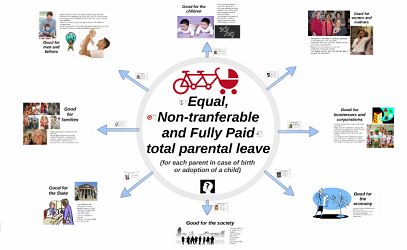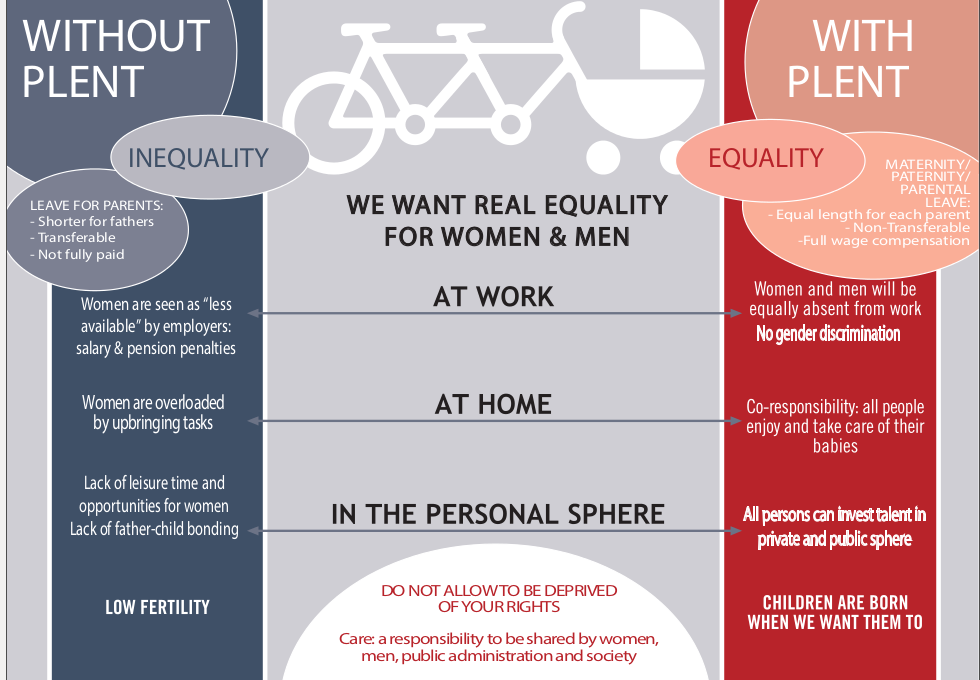On October 18th 2016, the Spanish parliament approved a proposal to make paternity and maternity leave equal. In practice, this means to increase the paternity leave to 16 weeks (from 2 weeks currently), as maternity leave is 16 weeks. And the most important to advance in the distribution of parental care: to define the leave as non-transferable, and to keep paternity and maternity leave fully paid, as they have been so far.
In addition, they have agreed the importance of a change in name, from maternity and paternity to a gender neutral term, which may be translated into English as “parental leave”, so diversity of families are equally included.
This is the third time that a proposal to reform the paid parental leave system is approved in the Parliament in Spain. The first one was in 2012 and it was approved by unanimity within the Equality Commission from the Parliament. The second happened in the short legislature ended last June 2016. This third time has been discussed and passed in a plenary session. Equal, non-transferable and fully paid parental leave for each parent is the reform passed by majority with 173 votes in favour (from Socialist Party, Podemos coalition, nationalist parties, mixed group) and just two votes against. People’s Party (PP) and Citizens (C’) abstained (164 votes) this time. However, PP’s representative declared that they “do not question at all (…) the equalization between paternity and maternity leave. We are absolutely in favour.”
PP’s argument given to not vote in favour, but an abstention, is about the budget needed for the reform, but that budget for the four next years is expected to be available. These both parties (PP & C’) have agreed to reform the paid parental leave system in a pact which is the roadmap to the new government. In this agreement, they included that they will implement the “necessary measures to make equal leave for the parents” and the budget needed to implement that reform in the next four years. That cost for this legislature is expected to be similar than the cost for the reform passed by majority for the first four years.
Ciudadanos, which counts with 32 MPs, is in favour of 8 weeks non-transferable for each parent plus 10-week transferable leave so far. As all data show, this reform would mean 18 weeks for mothers (8 non-transferable plus 10 transferable) and 8 weeks for fathers, maintaining the gender gap in care and labour participation of men and women. Therefore, they may change their current posture and accept the majority option of totally equal, non-transferable and fully paid parental leave. This reform would open the transferability option in the Spanish parental leave system with the negative gender impact that this brings according to the international evidence. Path dependency, such as the case of Sweden has shown over the last 40 years, can be very difficult to overcome.
Thus, it looks just a question of negotiation of the calendar and how to allocate the budget annually. And/or, maybe, a question of political game and who wins the medal of developing and implementing this reform widely desired by the society. But it’s also a relevant aspect of design and if political parties support the induvial right and responsibility of care, beyond sex, or if they introduce a back door, the transferability, so gender inequality can keep existing in our policies.
In the new phase of a government in minority where negotiations and agreements are needed to develop and implement the laws and policies, we expect that evidence-based arguments, research and international learning are considered for the final law to be passed.
Equal, non-transferable and fully paid parental leave is the sole goal of the Spanish and international platforms (PPIINA and PLENT, respectively). Civil society is pushing for a change in the distribution of parental care. The social awareness has increased thanks to PPIINA, which is shown by this great political step. However, more political action is needed to keep advancing. We want a society in which gender equality could be a reality.
Gender equality is an objective in many societies and a legal principle which constitutes more a desire than a reality nowadays. This reform will support the gender equality in the law, as first step. This unique measure will not solve the whole problem, but it will send a clear and solid message, that policy-makers also care and work for gender equality seriously. We are waiting to see this law passed by all our representatives as soon as possible.
All the political parties declared to be absolutely in favour of this reform. Thus, we expect that political parties act to pass the law and can share the recognition of implementing a policy which will be pioneer in the world. A new political environment of sharing the future approval of a law on equal, non-transferable and fully paid parental leave by unanimity would be a great symbol for the rest of necessary policies.






